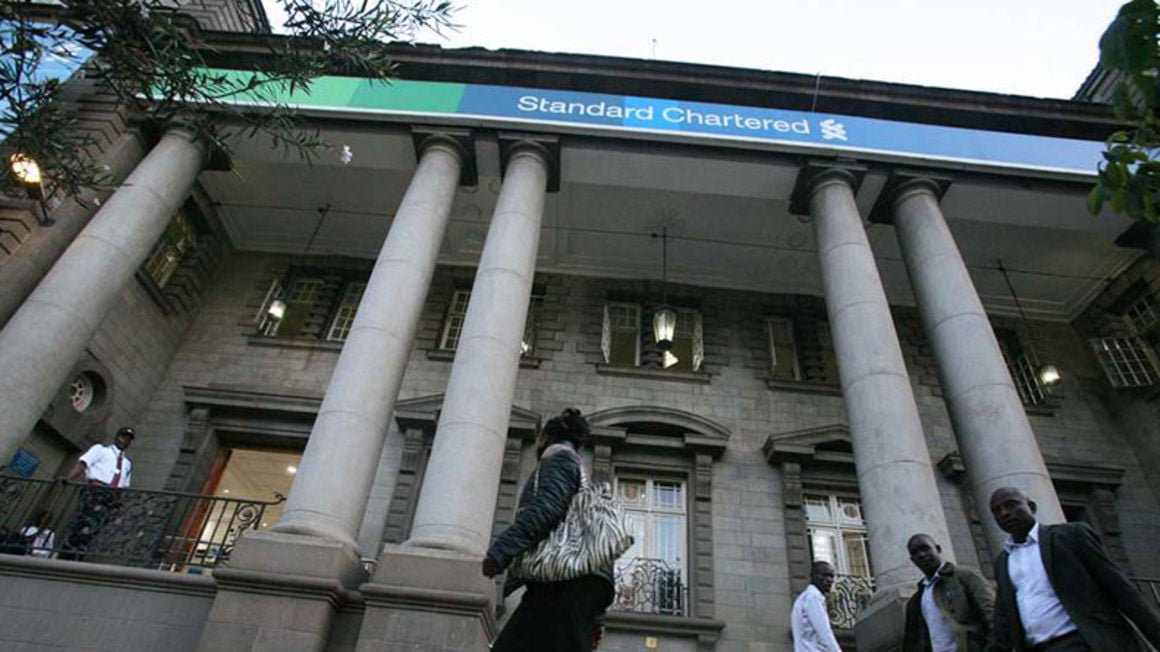
StanChart says that Kenya has foreign exchange reserves above $8 billion. FILE PHOTO | NMG
Summary
- The bank says its digital transformation strategy that started in 2016 has necessitated a restructuring of its workforce, leading to elimination of some roles.
- Jobs will be cut across management and unionisable staff, according to a brief sent to the Banking Insurance & Finance Union and seen by the Business Daily.
- The number targeted represents 14.3 per cent of its 1,397 workers on which it spent Sh7.4 billion in the year ended December 2019.
Standard Chartered Bank Kenya is laying off 200 employees or 14.3 percent of its workforce as the Covid-19 pandemic continues to ravage bankers’ profits.
The bank says its digital transformation strategy that started in 2016 has necessitated a restructuring of its workforce, leading to elimination of some roles.
Jobs will be cut across management and unionisable staff, according to a brief sent to the Banking Insurance & Finance Union and seen by the Business Daily.
The number targeted represents 14.3 per cent of its 1,397 workers on which it spent Sh7.4 billion in the year ended December 2019.
“In the circumstance, the bank intends to declare redundant the employees whose roles fall off as a result of the restructuring,” the lender wrote to the Banking Insurance & Finance Union.
“The impacted employees who are both in management and unionisable cadre are 200 in the retail banking, corporate banking, operations, technology and support departments.”
The job cuts are ongoing and will be implemented up to the end of the year.
StanChart becomes the second bank to lay off staff after NCBA Group
announced it was letting go of an unknown number of employees by December due to the impact of the Covid-19 pandemic on its business.
Banks have taken much longer to trim their payroll costs unlike most other sectors that instituted retrenchments soon after the pandemic struck the country in mid-March.
The lenders have seen their profits plunge due to increased provisions occasioned by higher credit risk due to the pandemic, which has triggered mass defaults.
Those being retrenched have been offered one month’s salary in lieu of notice, severance pay at the rate of one and a half months per year of service and pay for accrued leave days at the time of termination.
StanChart’s severance pay is triple the minimum legal requirement of 15 days basic salary for each completed year of service.
The fresh job cuts add to the previous retrenchments that saw the bank spend Sh1 billion to compensate a total of 190 employees made redundant by its automation programme between 2017 and 2019.
StanChart has invested heavily in Internet, mobile and video banking besides an upgrade of its ATM machines.
This has cut costs, enhanced efficiencies and reduced traffic to banking halls, a strategy that has gained currency in the wake of the Covid-19 pandemic.
StanChart has shed more than 600 jobs in the five years to 2019.
Keeping a lid on costs has become more urgent as bank earnings fall on the back of increased defaults and suspension of interest and principal repayments offered to customers hurt by the pandemic.
StanChart, for instance, had restructured loans worth Sh22 billion, representing 16.4 per cent of its loan book in the half year ended June. Its net profit in the review period dropped 31.2 per cent to Sh3.2 billion on higher provisions for coronavirus-related defaults and reduced income from loans.
The lender did not declare an interim dividend, joining others like KCB
that also suspended payouts to conserve capital.
Suspension of the cash distribution has seen StanChart save Sh1.8 billion, based on its previous payout of interim dividends of Sh5 per share.
Its loan loss provision jumped 4.2 times to Sh1.6 billion in response to gross defaults rising 5.6 per cent to Sh20.9 billion.
The job cuts at NCBA –the product of the combination of the former NIC Group and CBA Group— come after the expiry of the one year during which it was not allowed to fire employees following the merger.
The Competition Authority of Kenya had ordered the merged entity to retain all staff within 12 months of the completion of the merger, which took effect on September 30, 2019.
NCBA says it is trimming its workforce because of the impact of the pandemic.
The bank is running a voluntary exit programme alongside a redundancy plan to achieve its target downsizing whose scale it has not disclosed.
Those who volunteer to exit will be paid one month salary for each year of service, among other benefits. NCBA says those declared redundant will be compensated based on the law.
“Now more than ever, we need a flatter, nimbler organisation that can withstand the challenges of the day, operate with greater competency and capture the opportunities of tomorrow. Hence the decision to kick off this programme,” NCBA wrote to its staff.





No comments :
Post a Comment